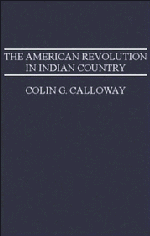Book contents
- Frontmatter
- Dedication
- Contents
- List of figures and maps
- Preface
- Acknowledgments
- Abbreviations
- Prologue New worlds for all: Indian America by 1775
- 1 Corn wars and civil wars: the American Revolution comes to Indian country
- 2 Odanak: Abenaki ambiguity in the North
- 3 Stockbridge: the New England patriots
- 4 Oquaga: dissension and destruction on the Susquehanna
- 5 Fort Niagara: the politics of hunger in a refugee community
- 6 Maquachake: the perils of neutrality in the Ohio country
- 7 Chota: Cherokee beloved town in a world at war
- 8 Tchoukafala: the continuing Chickasaw struggle for independence
- 9 Cuscowilla: Seminole loyalism and Seminole genesis
- 10 The peace that brought no peace
- Epilogue A world without Indians?
- Index
3 - Stockbridge: the New England patriots
Published online by Cambridge University Press: 18 December 2014
- Frontmatter
- Dedication
- Contents
- List of figures and maps
- Preface
- Acknowledgments
- Abbreviations
- Prologue New worlds for all: Indian America by 1775
- 1 Corn wars and civil wars: the American Revolution comes to Indian country
- 2 Odanak: Abenaki ambiguity in the North
- 3 Stockbridge: the New England patriots
- 4 Oquaga: dissension and destruction on the Susquehanna
- 5 Fort Niagara: the politics of hunger in a refugee community
- 6 Maquachake: the perils of neutrality in the Ohio country
- 7 Chota: Cherokee beloved town in a world at war
- 8 Tchoukafala: the continuing Chickasaw struggle for independence
- 9 Cuscowilla: Seminole loyalism and Seminole genesis
- 10 The peace that brought no peace
- Epilogue A world without Indians?
- Index
Summary
On a cold January night in 1778, Albigence Waldo, a homesick Connecticut surgeon serving with Washington's army at Valley Forge, was called to minister to a dying soldier. The man expired before Waldo reached the hut where he lay, but his passing prompted the doctor to reflect on life, death, and the human condition:
There the poor fellow lies not Superior now to a clod of earth – his Mouth wide open – his Eyes staring. Was he affrighted at the scene of Death – or the consequences of it? … What a frail – dying creature is Man. We are Certainly not made for this world – daily evidences demonstrate the contrary.
Such thoughts in the midst of war and in face of death may not be unusual, but in this case the fallen comrade in arms, dying in a place that has become symbolic of America's struggle for freedom, was an Indian.
Ever since the Declaration of Independence denounced the Indians as “savage” allies of a tyrannical monarch, those who fought with, rather than against, the Americans have tended to be forgotten. The Oneidas, Tuscaroras, and several tribes in Maine and Nova Scotia lent their support to the American war effort, as did Indian towns in southern and central New England. No Indian community gave the patriot cause more dedicated service than the town of Stockbridge, Massachusetts, a composite community of Mahican, Housatonic, and Wappinger peoples from the Hudson Valley and western Massachusetts. The Stockbridge experience vividly illustrates that though Indian people laid down their lives in the cause of freedom, they could not enjoy the benefits of freedom once it was won.
According to a native account, the Mahican or Muhheakunnuk nation were formidable before the Chuckopek or white people came to their country: “Before they begun to decay, our forefathers informed us, that Muhheakunnuk nation could then raise about one thousand warriors.” But ever since the Dutch established trading posts on the Hudson River early in the seventeenth century, the Mahicans had endured devastating new forces.
- Type
- Chapter
- Information
- The American Revolution in Indian CountryCrisis and Diversity in Native American Communities, pp. 85 - 107Publisher: Cambridge University PressPrint publication year: 1995



